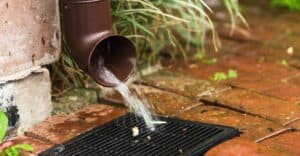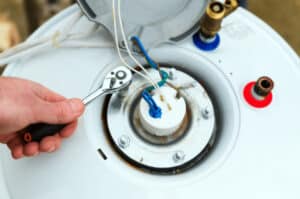Hard water can damage plumbing equipment at a faster rate over time. Unfortunately, there is no way to avoid hard water if a property stands in an area where the water supply contains minerals that harden the water.
Calcium and Magnesium harden the water. This has no health implications, but the calcium and magnesium deposits can have an effect on the plumbing system. For instance, the calcium and magnesium deposits can cause discoloration, and later on, clog pipes and cause plumbing malfunctions.
On one of their website articles, Realtor.com explains how hard water can corrode pipes. “Hardness levels of your water can create major issues with your plumbing system. Scale deposits from hard water can build up inside pipes—like plaque inside an artery, constricting the flow of water—eventually causing pipe backups that need to be addressed by a plumber.”
Read the rest of their explanation here.
For homemakers, hard water could be a bane of existence. Imagine having to scrub tiles, countertops, sinks, tubs, and toilets more often just so rings and stains could be avoided?
The residue buildup caused can be unsightly, but there are ways to clean them up quickly and to prevent them too. Home improvement website The Spruce rounded up tips that could help homeowners clear up hard water stains in their bathrooms and kitchen.
Moreover, hard water generally smells unpleasant compared to regular water that does not contain much calcium and Magnesium. Its smell can be likened to rotten eggs.
“There is no need to use harsh and costly chemicals to prevent hard water toilet stains. Borax, vinegar, and baking soda do a great job of cleaning and disinfecting. Used regularly, they will prevent hard water stains from building up. To help keep your toilet clean and free of hard water buildup, try regular cleanings with Borax, which can help to soften hard water. Just use 1/4 cup Borax with every cleaning.” Check out the rest of the tips here.
Another damage that hard water may cause is inefficient water heating. The buildup of minerals and residue can make it harder for a water heater system to operate efficiently.
Expert plumbers, however, assure homeowners that there is a work-around for having a hard water supply. Installing a water softener is the best way to mitigate the effects of hard water into plumbing fixtures.
The website Popular Mechanics has described what a water softener does, and how it helps with hard water supply. “Water enters the top of the water-softener tank and percolates down through the resin beads. The resin has a negative charge, which attracts the positively charged minerals in the water (a process known as ion exchange). The mineral deposits cling to the resin, and the now-softened water exits the softener tank and flows throughout the house.”
Read the rest of the article here.
Licensed plumbers can install hard water softeners. Professional installation is highly encouraged to ensure its efficiency.

.svg)

